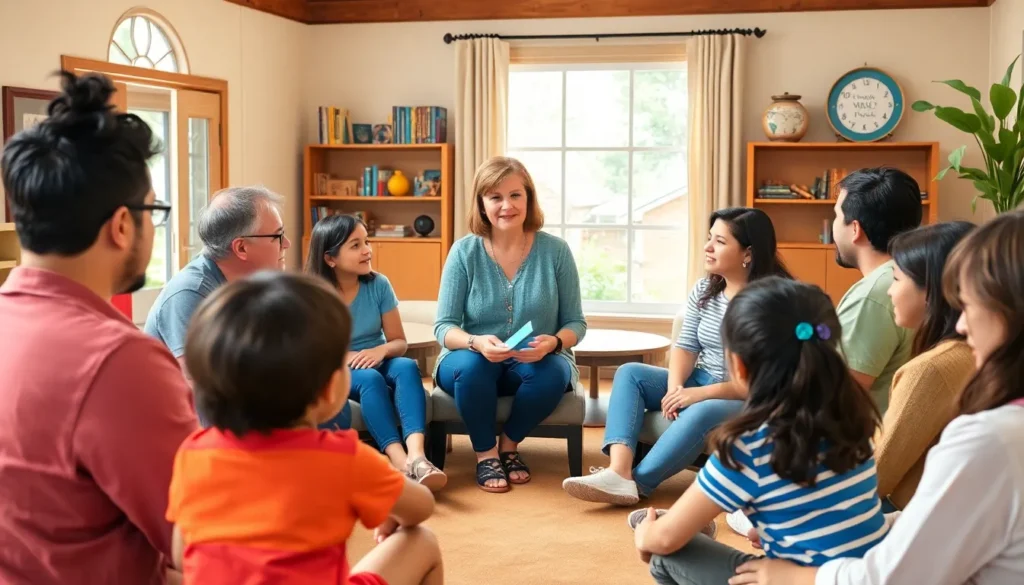Family life education isn’t just another buzzword tossed around at dinner parties. It’s the secret sauce that helps families navigate the wild ride of life together. From teaching kids about relationships to prepping parents for the rollercoaster of adolescence, this education is all about fostering healthy connections and building strong foundations.
What Is Family Life Education
Family life education encompasses programs designed to enhance the knowledge and skills of individuals and families in various aspects of family living. Topics within this education typically include communication, relationships, decision-making, and parenting. Participants gain insights into fostering healthy relationships and developing effective conflict resolution strategies.
Children learn about the dynamics of family life through age-appropriate lessons and activities. These experiences promote understanding of values, responsibilities, and emotional intelligence. Parents receive guidance on navigating the challenges of adolescence and supporting their children through developmental changes.
Educators play a crucial role in delivering family life education. They utilize interactive methods, such as role-playing and group discussions, to engage learners. Research shows that effective family life education can lead to improved family dynamics and reduced rates of family-related issues.
Diverse settings often provide family life education, including schools, community centers, and online platforms. Many programs target specific populations, aiming to address unique cultural and contextual needs. Evaluation of these programs demonstrates their positive impact on strengthening families and enhancing individuals’ capabilities.
Community involvement remains essential in promoting family life education. Partnerships with local organizations can increase awareness and access to resources. Overall, this education serves as a foundation for building strong families that thrive in various aspects of life.
Importance of Family Life Education

Family life education significantly influences the well-being of families and communities. This educational approach builds strong foundations by equipping individuals with essential skills.
Benefits for Families
Family life education enhances communication among family members. Participants learn to navigate relationships effectively, which fosters healthy interactions. Children grow up understanding family dynamics, leading to improved emotional intelligence. Parents gain tools to manage conflicts, reducing tension at home. This structured learning cultivates resilience when facing life’s challenges. Moreover, the program supports healthy decision-making, creating a positive environment for all family members.
Benefits for Communities
Communities benefit through stronger family units that contribute positively. Enhanced family relationships often lead to lower rates of crime and substance abuse. Families equipped with life skills foster a sense of stability in neighborhoods. Active participation in family life education promotes social cohesion among diverse populations. Collaborative efforts with local organizations strengthen community ties and improve access to resources. Additionally, these programs encourage a culture of support, which propels community development.
Key Components of Family Life Education
Family life education includes essential components that equip individuals and families with valuable skills. These components enhance family dynamics and promote healthy relationships.
Communication Skills
Effective communication forms the backbone of any strong family unit. Participants learn active listening techniques that foster understanding. Different methods, such as role-playing exercises, offer practical insights for expressing emotions clearly. Family members improve their ability to articulate thoughts and feelings, resulting in reduced misunderstandings. Enhanced communication skills not only benefit immediate family but also improve relationships in broader social circles.
Parenting Strategies
Parenting strategies focus on equipping parents with tools for raising confident and capable children. Supportive parenting techniques encourage discipline and nurturing in a balanced manner. Classes guide parents through developmental stages, providing age-appropriate approaches for each phase. Parents gain insights into managing behavioral challenges effectively, ensuring a stable home environment. Practical examples and discussions empower parents to implement strategies that nurture their children’s emotional and social growth.
Relationship Building
Relationship building emphasizes cultivating and maintaining strong connections within families. Participants explore the importance of trust, respect, and empathy in family interactions. Activities designed for all ages help family members understand each other’s perspectives better. These experiences promote bonding and strengthen relationships, reducing conflicts over time. Emphasizing mutual understanding allows for deeper connections that enhance overall family well-being.
Challenges in Family Life Education
Family life education faces several challenges that can hinder its effectiveness. Understanding these obstacles is crucial for improving such programs.
Societal Attitudes
Societal attitudes shape perceptions of family life education. Many believe it is unnecessary, underestimating its benefits. Stigmas surrounding discussions of family issues often prevent open dialogues. Some view these programs as irrelevant or intrusive, leading to resistance among families. Changing perceptions requires concerted efforts from educators, community leaders, and families. Increased awareness campaigns can promote understanding and acceptance of family life education benefits.
Resource Availability
Resource availability presents another significant challenge. Many communities lack access to quality programs, making participation difficult. Financial constraints can limit the scope and reach of family life education initiatives. Educators frequently struggle with inadequate training, impacting program delivery. Collaboration with local organizations can expand resources, ensuring more families access quality education. Allocating funds toward these programs enhances their effectiveness and sustainability.
Conclusion
Family life education plays a vital role in nurturing strong family dynamics and enhancing community well-being. By equipping individuals with essential skills in communication relationships and parenting it fosters resilience and emotional intelligence. Through structured programs families learn to navigate challenges together creating a supportive environment that benefits everyone involved.
Despite facing challenges such as societal perceptions and resource availability the impact of family life education is profound. With ongoing collaboration and awareness efforts communities can strengthen these programs ensuring that families receive the guidance they need. Ultimately investing in family life education leads to healthier families and a more cohesive society.

